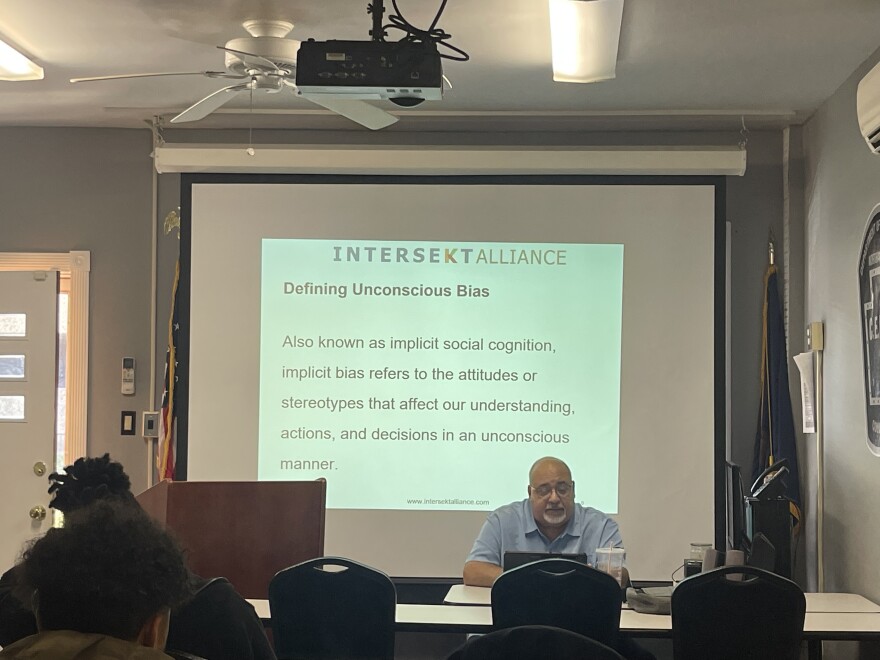EASTON, Pa. — Midway through the training session, new hires from the Northampton County Department of Corrections split into groups.
The women moved to the back of the room and the men stayed in the front.
The point of the exercise was not to divide the trainees, but instead to hold a thought-provoking conversation about gender, race and other stereotypes the soon-to-be correctional officers might face on the job.
The three-hour course was taught last week by Guillermo Lopez Jr. of Intersekt Alliance, a Bethlehem-based multi-cultural group that offers consulting in conflict resolution, leadership, team building and cultural awareness.
Lopez, a longtime community liaison and former Bethlehem Steel worker, has been teaching the course at Northampton County Prison for seven years.
He has also led similar courses for law enforcement departments in Bethlehem and Easton, and served as a Latino constituency director for the National Coalition Building Institute.
Sharing personal stories
The training was attended by five Black and Latino newly hired corrections officers in a facility near the county prison in Easton.
Along with the session, the new hires will shadow other officers inside the jail and participate in intensive training including a code of ethics course and safety and defensive classes before they are able to graduate in five weeks.
Lopez's class served as a type of icebreaker for the newly hired officers on their first day on what can often be a dangerous, stressful job. It also was in contrast to the stereotype of prison guards and prisons portrayed in popular culture.

"You're being taught in a way that is progressive and healthier and more meaningful for your mental health as well as the mental health of others — for the people that you look after," Lopez told the group.
"I think there's a some truth to the fact that the institution is more of a mental health facility than it is a jail," he said. "We ask that you keep that in mind. As we transform these institutions, these philosophies that we're putting out here lead to that conclusion. This workshop does not replace any safety training, or any of your code of ethics manual. That's your Bible, and trust your training. If you feel like you're in danger, believe you are in danger."
For the first 30 minutes, the group introduced themselves during an exercise Lopez calls, "Who's in the Room?" where participants were asked to share something light-hearted that they don't normally discuss in a group setting.
One trainee shared she liked to sing, while another said he had a habit of correcting people.
As with all the group exercises held during class, the trainees applauded one another after each person shared.
"Let me tell you that for you to be successful, it requires that you all have each other's back. It requires that you learn what you do well and what they do well," Lopez said.
"Instead of competing, you actually blend and look to each other. Instead of looking for a weak link, you look for what everyone's strengthening and you blend it. I have a saying that when one of you gets sick, the rest of you become a nurse. That's how you look out for each other in this kind of setting."
Combating stereotypes, 'don't be a bad apple'
Lopez split the trainees into three affinity groups: women, Black men and Latino men.
Each group talked privately for five minutes on what stereotype they hoped people would never say or think about them.
The end results shared among the five people were honest and thought-provoking.
"We talked about leadership roles. Guillermo [Lopez] and I feel like Latinos in general feel like they find the lesser of the jobs, the problem or the totem pole [jobs]," Julian Liaci said. "Another one is how Latinos [are viewed] in cinematography. They're not really ever the main character. It's always a side character. Or in a crime show they'll make Latinos the junkies, the chain smokers or something."
The Black men in the class shared about stereotypes they confronted, too.
"We feel like a lot of people think that as Black men we're going to be absent fathers. I've heard the joke hundreds of times," Vaughn Colva said.
"Or that Black men are not intelligent. I've been called Uncle Tom more than once and passed up for leadership. We also talked about driving while Black, because when I was 16, my mom had a conversation with me about If you get pulled over, keep your hands on the steering wheel, don't make any sudden movements, ask if you can get a document or your driver's license, so nothing will happen."
A goal of the lesson aims to help corrections officers interact with incarcerated persons, and staff.
"Stereotypes play a role. We don't dig enough for the truth, we just rely on what's easy or supports our fears versus getting past our fears and getting to know people," Lopez said.
"There's not enough of us who are willing to be in the middle to help people understand each other. And that's what I'm challenging us to be. Be that bridge. That's what a lot of these inmates are needing, is people that let them find their way back. They're human like the rest of us."
Lopez also addressed common typecasts of corrections officers.
"I would say to you the majority of corrections officers are good people. And just like anything else, it only takes one bad apple to spoil it," Lopez said. "Don't be that bad apple. Real simple. And, don't think that you alone can think your way out of these situations. Turn to each other. Turn to someone that has more authority than you. They'll help you think your way out of this."
Hiring new officers
Staffing the county prison is a constant job. Since 2018, Northampton County has hired 376 corrections officers, said county Executive Lamont McClure. The county hired 86 in 2023 and 48 so far this year, he said.
In April, McClure appointed Michael Pittaro as director of the Department of Corrections after James Kostura retired after 31 years.
According to the Federal Bureau of Prisons,60.8 percent of its prison staff are white, while 21.4 percent are Black and 14. 2 percent are Hispanic.
LehighValleyNews.com asked Northampton County for a breakdown of its corrections staff by race but did not receive a response.
"Corrections is one of the most diverse workplaces you're ever going to be," Lopez said. "This kind of community that's normally dominated by white people. Think about the dominance that they have had and how their dominance allows them to control, and I'm not saying this in a negative way. I'm just saying that that's how it sort of worked out."
"For us to get this right, we've got to be willing to speak to that dominance in a way that helps it dismantle itself. When we as good people speak to people at their good parts, chances are they'll shift with us. I truly believe that. I think I've been more successful at helping people change their attitude, shift their attitude towards how we work together, versus holding on to their dominance and saying they're in power and they're in control, so keep that in mind. Don't be overwhelmed by the old system that is so entrenched. We're chipping away at it because of the new people that keep coming in and insistent to be different."
The county said it is dedicated to hiring corrections officers from all backgrounds.
"We are committed to having a qualified, competent workforce that looks like Northampton County looks," McClure said.
'We have a common story'
As the training session came to a close, class participants reflected on what they learned.
"The highlight of the day is getting to know everybody here better. I'm going to be with you guys for the next five weeks and I have a better understanding than just coming in, saying hello and writing things down, being machines," said Daniel Green.
"One thing I'm gonna take away is that [you are all] different, but the same. We basically have a common story and I appreciate all of you guys."
As the group clapped for each other one last time, Lopez smiled.
"We shouldn't have to be professional clinicians to be able to listen to each other. The whole purpose of this is so that you don't have to go through [life] asking yourself questions about each other," Lopez said.
"It's to get to know each other, to trust each other. The more you look out for each other and share with each other, the more successful you'll be because it can be grueling and at times it's going to be tough but It's not just about putting your hours to work.
"It's about putting quality, healing, helping people out."


